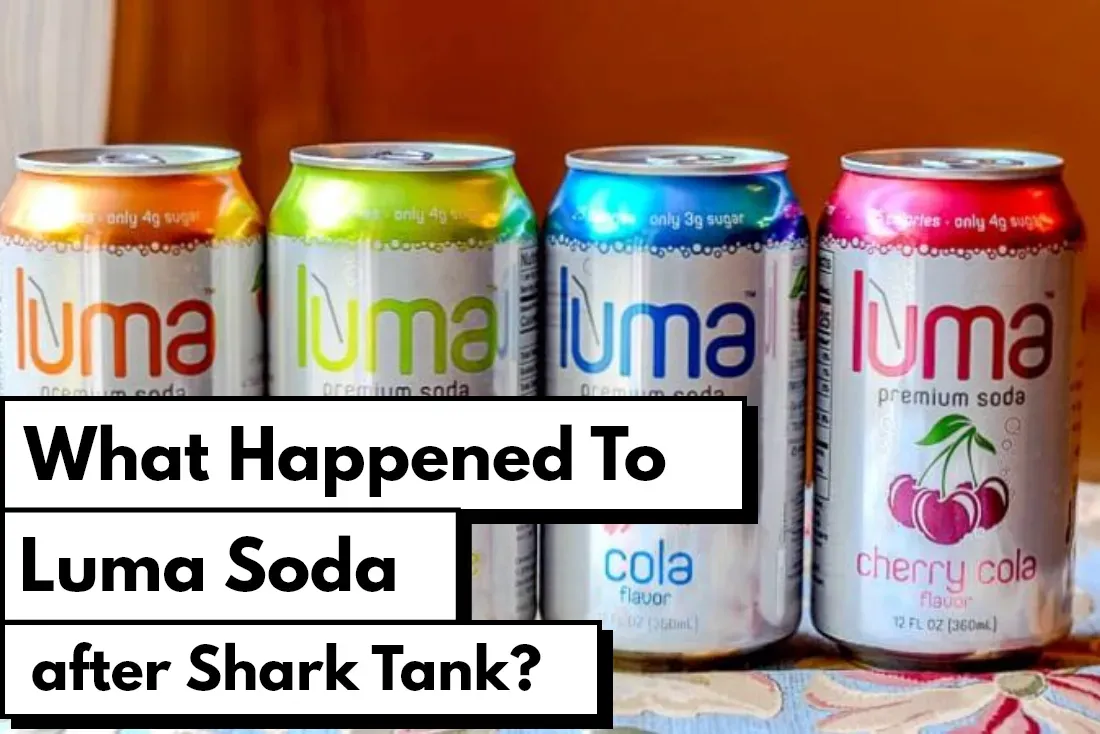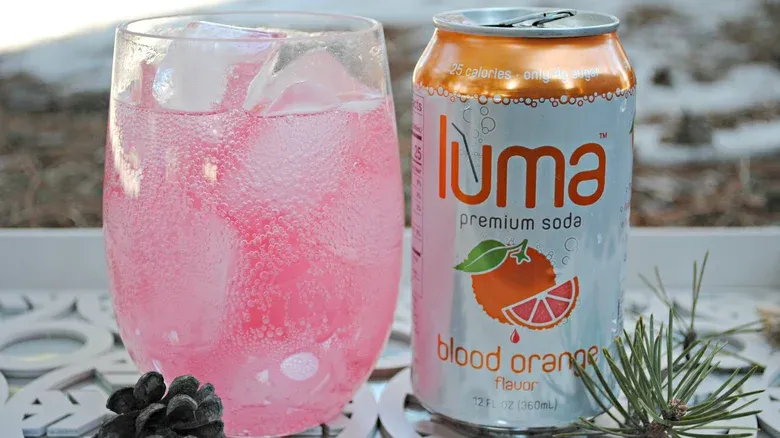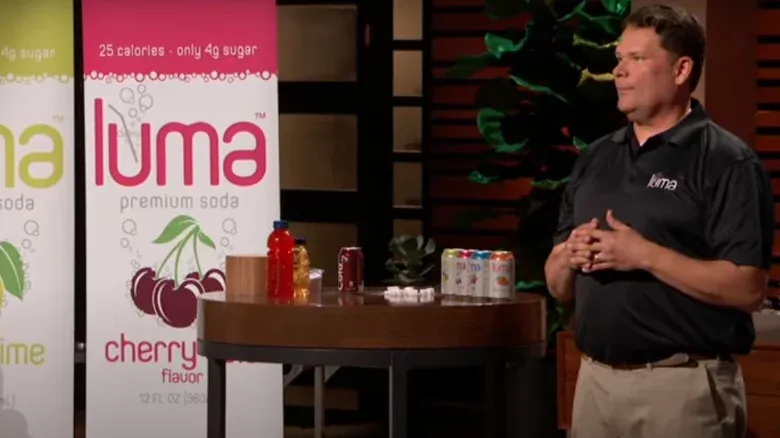Luma Soda: What Happened To Luma Soda After Shark Tank

Tarun Paliwal
Published on:
November 29 , 2023
·8 min read

Promoting a new product is seldom as simple as posting a social media campaign unless you have the uncanny power to generate viral content in a jiffy. According to the US Small Business Administration, a viable business strategy, impactful advertising, plenty of quickly deployable money, and other factors are required to create worthwhile economic returns for a new business.
This is where "Shark Tank's" affluent investors step in. Members of the general public are invited to participate in the program to pitch their ideas to self-made business giants and grant them a portion of their company in exchange for monetary investments. The majority of those who receive funding from the tycoons continue to run their enterprises, with notable development and profits as a byproduct of the show.
However, not all of the items and businesses featured on the popular show seem to perform well. Luma Soda, which participated in Shark Tank Season 10, is an example of this. Let's find out in this article whether the firm rose or crashed once it hit the shops. In January 2017, Jim Otteson founded Luma Soda in order to "correct the detrimental consequences huge soda corporations have had on this earth."

The beverages contained no sugar – the sweet taste came from a combination of monk fruit and honey — and no chemical ingredients, artificial colors, carbs, or preservatives. Otteson charged $19.99 for a 12-pack of four flavors: cola, cherry, blood orange, and lemon-lime. As a better choice than conventional soda, you can move to Luma Soda.
Luma Soda is enjoyable if you want a little bit of caffeine in your beverages. The average American spends $11 billion more on coffee than they do on soda ($65 billion). Therefore, Luma Soda makes a great substitute for coffee if you adore caffeine. If you are addicted to artificially flavored sodas and couldn't live without them, Luma Soda might have been the ideal substitute for you. Before we get into the founder and the pitch, let's take a deeper look at the product, Luma Soda.
What is Luma Soda?

Luma Soda is a low-calorie healthy soda. It is distinctive from other sparkling drinks because it is prepared with organic substances. Luma Soda contains no hazardous chemicals or additives and is available in a variety of flavors.
Many varieties are available, including Blood Orange, Cola, Cherry, and Lemon Lime. Luma Soda only has 4 grams of sugar. It contains natural sweeteners such as honey and monk fruit. For those who prefer carbonated beverages or diet sodas, it is a far safer alternative. Fizzy drinks and caffeinated drinks contain potentially dangerous ingredients, additives, and preservatives to improve shelf life, as well as artificial sweeteners and other synthetic tastes to enhance flavor.
Who founded Luma Soda?
Luma Soda was founded by Jim Ottosen. Jim had been practicing law for more than 25 years and often drank large quantities of Pepsi while getting ready for court. When Jim discovered that soda includes a lot of sugar, artificial flavors, additives, and hazardous chemicals that are dangerous to his health, he started to worry about his physical well-being and quit drinking soda.

He gave up Coke and began searching for a low-calorie diet. Even after extensive research, he was unable to identify a trustworthy and safer soda substitute. Although he discovered some of the items recommended as soda's healthier substitutes, they didn't impress him. That is when he made the decision to establish Luma Soda, a low-calorie beverage company. He decided that the drink he would make would be devoid of damaging ingredients, preservatives, and additives.
The Luma Soda Pitch
On Shark Tank, Jim Ottosen asked for a $500,000 investment in exchange for a 20% interest in Luma Soda. Jim shares his story of how he came up with the concept for Luma Soda and what drove him to market it. He also gave the sharks a couple of samples of Luma Soda.
The various flavors of Luma Soda appear to be appealing to some sharks, notwithstanding the sharks' reactions to Luma Soda were inconsistent. The sharks questioned him about his investment in Luma Soda and the company's current sales stats.
Jim responded that he had spent $1.75 million on Luma Soda and had earned $180,000 from Luma Soda's overall sales, with just under 10% of customers placing repeat orders. When they saw the sales number, the Sharks appeared apprehensive. Some sharks supplied entrepreneurs with insightful advice on how to market their goods and increase sales.
Barbara Corocan offered $250,000 and stated that she would only invest if she was joined by guest shark Rohan Oza. However, Rohan chose against investing since he believed that this company was still in its development and preferred to collaborate with more experienced businesspeople.
Thus, Barbara and Rohan declined to proceed with the agreement. Mark made an effort to inspire Jim, but he declined, saying that this industry was not right for him. Mr. Wonderful refused to finalize the agreement and advised the business owner to shut down like other people. As a result, Luma Soda was unable to come to an agreement or close a transaction on the Shark Tank Show.
Where is Luma Soda Now?
The drinks are still available from the company both in shops and online. The drink containers may be purchased online at stores like Amazon as well. Currently, Luma Soda is collaborating with a few carefully chosen partners. The price of their 12-pack soda can set, which is roughly $19.99, is a little bit higher than that of comparable drinks on the market. As of 2022, Luma Soda is no longer in operation. Several partners help Luma Soda sell its beverages in the United States. If you want to sip on this better-for-you soda substitute, you can also buy Luma Soda online.

When a business endeavor fails, it might be incredibly challenging if the owner paid $1.75 million of their own money in it, leaving only $30,000 in the bank. But given that only $180,000 in sales were generated as a result of that investment, it is hardly shocking that Jim Otteson's goal of developing Luna Soda failed. Luma Soda officially stopped operations in 2021. According to the Shark Tank Blog, Otteson practiced law for 26 years before leaving to establish Luna Soda. Otteson is now described as a managing director at the legal recruiting firm Major, Lindsey, and Africa.
Despite the fact that the majority of the product variants are sold out, you may still buy the items through a variety of online sites. Several wholesalers provide Luma Soda's products in the US. Additionally, Luma Soda may be purchased online if you wish to try this healthy soda substitute.
There are non-additional, non-preservative, and harmful chemical-free Luma Soda substitutes on the market. But when it comes to not having any added sugar or preservatives, Luma Soda is unrivalled by any other beverage.
Have a business idea in mind? Here's how you too can get started
Step 1: 🛒Setup your Ecommerce Store
For the second half of 2022, retail eCommerce sales in the US alone totaled about $257 billion. This is an increase of 2.7% compared to the previous quarter. The most effective marketing tool you will ever have is your eCommerce website.
- For instance, with effective SEO, your eCommerce marketplace will show up in the top SERP results. Additionally, social media platforms will give you a venue to interact with and gain your clients' confidence through ratings and feedback.
- So where do you start? If you take a quick look at the Shark Tank contestants, you’ll get a straightforward solution- Shopify! This article highlights Shopify’s stronghold on the eCommerce sector, with 11 out of 13 brands choosing Shopify as their preferred platform to sell. Moreover, several popular Shark Tank brands like Bombas, Buttercloth, and more sell their products on Shopify.
Step 2: 💌 Start Sending Newsletters
Global email user numbers were projected to reach 4.3 billion in 2022. In 2025, this number is projected to increase to 4.6 billion, accounting for more than half of the projected global population.
Additionally, this Forbes article highlighted the impact email marketing had in the lives of successful Shark Tank contestants.
They found that email is the preferred medium for communication for 72 percent of buyers over any other platform. You can access an incredible customer base through email, and the best way to do it for your business is to invest in a solution that helps you create captivating content. If you’re looking for solutions to try out, these are among the best in the email marketing industry:
1) Awesome Send
Awesome Send is designed to empower ecommerce firms to attract and retain consumers, with a plethora of high-converting emails templates. Awesome Send also offers a robust Shopify integration that helps you connect information between your online store and email strategy seamlessly. Awesome Send's solution is accessible to all at a $39 flat with all features for users worldwide.
2) GetResponse
Get Response includes a good amount of tools that can boost your sales, like sales tracking, empty cart campaigns, and integrations with marketplaces like Magento and Shopify. GetResponse Free offers a free plan. But it has a monthly email send cap of 2500 newsletters for individuals with fewer than 500 subscribers. However, if you want to use capabilities like marketing automation or e-commerce features, things can get pricey very quickly.
Step 3: ⚡Grow your audience on social media
According to the most recent social media figures, there will be 4.59 billion social media users globally in 2022, and this number will only increase over the following several years (Statista, 2022). That currently represents around 57.5% of the world's population. Social media is the cornerstone of every successful marketing campaign in current times.
A wonderful example of an organization that has built its brand on the foundation of an effective social media approach is Grace & Lace from Shark Tank Season 5. When the entrepreneurs initially entered the tank, they asserted that their DTC site accounted for 90% of their more than $800k in revenues and that they hadn't yet spent a single penny on marketing. The business's socks profited from having over 34k incredibly engaged Facebook followers on top of being a popular pin on Pinterest.
Social media is about interacting and engaging; it's about establishing and sustaining relationships and using those interactions to promote your professional aspirations. And having genuine conversations is the sole strategy to do that.
You must be willing to pay attention, genuinely listen to what your community has to say and create consistent, high-quality content. So how can you do that with several competitors vying for the same success? Invest in a social media management platform!
1) Awesome Social
With Awesome Social, your go-to social media scheduler, you can publish to all platforms simultaneously, share your content ideas with your team, manage numerous accounts from a single window, and seamlessly organize social media posts. Awesome Social is ideal for people seeking straightforward social media management features and offers four flexible pricing plans that start at $16 which you can choose from according to your unique needs.

2) Sprout Social
Sprout Social is another great social media management app, however it functions more like a suite of tools for managing social media. You can manage your social media scheduling, inbox, mentions, and analytics with this web and mobile application. Sprout Social is a strong, comprehensive solution with a tonne of capabilities for the sophisticated social media marketer. However, its $249 introductory price may not be ideal for small businesses or independent owners who cannot make full use of its complex capabilities.